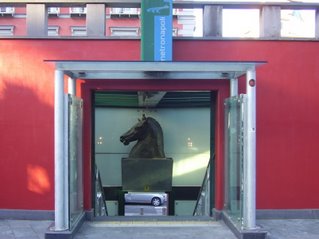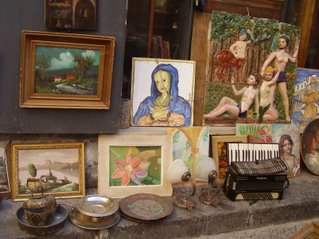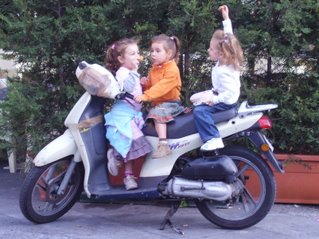Buon appetito!
Sunday 26 November 2006
Saturday menu
Buon appetito!
Local Images
Thursday 16 November 2006
Fair Fare
Food is a big part of life in Italy. In particular, southern Italians are dedicated food enthusiasts. Protective, proud and fond of their local produce, recipes, delicacies and culinary history it all adds to the flavour of daily life.
This has been clearly demonstrated by two recent events.
One of the adult students in my government class, Enzo, returned after two weeks of travelling to USA. As his first trip he spent considerable time in New York, but also visited Washington, Baltimore, Philadelphia, Buffalo and the Niagara falls.
“So, how was your trip?” I asked as he wandered into the classroom.
His winced, his face registering both his disappointment and distaste, “The food was terrible. I much prefer Italy”.
Somehow I wasn’t surprised, but still the idea of ten days in a city like New York left me wondering what was so bad about the food. “Enzo, New York is a great city, full of international restaurants and food.”
“Yes, but I only ate hamburgers and chips, and steak. I don’t like food with a lot of pepper and …how do you say (I interjected with ‘spices’), yes spices.” Holding onto his abdomen he indicated that spicy food upset his digestive system.
I had once again stumbled across the loyal pasta and pizza Neapolitan, both reluctant and unadventurous to sample new, unknown cuisines that might stretch the palette. I’ve met them before, and in fact I remember that Gigi was himself somewhat unaccustomed to eating certain foreign foods when we first met. He was okay with rather ordinary English and other European foods, but Thai food, Chinese and Japanese cuisine presented the unknown.
Later that evening Gigi confirmed my belief that many Italians are stuck in a bias towards Italian food, to the extent that they won’t try anything that is unfamiliar. And even if they do, they often don’t enjoy the experience. Although it is possible that they come to the table with a closed mind and an inability to experiment, savour the opportunity and take pleasure in something that doesn’t resemble traditional Italian cuisine.
Enzo’s strong, somewhat emotional, response to my question ‘How was your trip?’ certainly summed up the average Italian perspective when they travel overseas. It wasn’t the people, the architecture, cityscapes and landscapes or vibe of the places that he’d visited that made an intense impression. It was the food.
The second situation was the weekend itself. Saturday evening two teacher friends visited, and as we waited for Gigi we enjoyed an antipasto snack of sliced capsicum cooked in olive oil with garlic and capers. As we gossiped I was pleased to see Dana and Jody soaking up the flavoured oil with the crunchy bread I’d picked up at the bakery just an hour earlier, still warm and aromatic. Dinner was pasta e ceci, pasta with chick peas, a classically southern dish, and perfect for the cooler weather.
Pasta e Ceci Recipe
In a saucepan lightly fry a diced onion in a tablespoon of virgin olive oil until transparent
Throw in a 400 gram tin of chick peas, including the liquid
Crumble a stock cube into the saucepan, and stir until dissolved
Add two cups of water and a dash of salt.
Once the water has come to the boil add pasta (small-medium size) and stir through. Use about 500 grams pasta for 4 generous serves.
Add extra hot water if required. As the pasta cooks it will absorb the liquid, effectively cooking the sauce and the pasta together.
Continue to stir to prevent the pasta from sticking.
Add further salt to the soupy mix if required.
Once the pasta is al dente, most of the water should have been absorbed or evaporated, leaving a flavoursome chick pea sauce.
Spoon into bowls, serve with fresh bread.
Serves 4
Variations:
Add a dried chilli for additional flavour
After cooking the onion, add a chopped ripe tomato and chopped parsley
For a thinner sauce, drain the tin and use more water instead
This was followed by a typical green salad. If you go into a restaurant in Italy and order a green salad, don’t expect anything fancy or complicated. You will simply receive a plate of green lettuce leaves, ripped up to bite size pieces, generally already dressed in olive oil and freshly squeezed lemon juice, salted to taste.
Sunday is traditionally a day that involves visiting family for a late, lengthy lunch. Last weekend was no exception, although Rosa and Irene came to visit us at our urban cave. Mid morning we strolled down to the local market, umbrellas sheltering us from the intermittent rain, and bought some supplies for lunch. It is normal for people to shop almost every day here, buying whatever is required for lunch and dinner that day, with a focus on produce that is fresh and seasonal.
Gi called his family and they confirmed they would arrive at about 1pm. At 2.40pm they buzzed, and immediately began complaining about how long it took them to find a park, and then the queue of customers at the patisserie shop.
Gi was cooking and we started eating lunch at 3pm with plates of steaming orecchiette pasta (so called as they are shaped like little ears) ‘alla barese’ with broccoli, chilli, garlic and olive oil. The second course was a local fish (spigola) that Gigi had shallow fried in a glaze of onion, white wine and parsley, accompanied by a green salad. And as always piles of fresh crusty bread.
No longer had Irene put her fork down and she was chafing at the bit to get onto dessert. Her mother managed to persuade her, like you would an impatient toddler, to wait until we’d digested for five minutes and prepared espresso coffee.
They had walked in with the two packages of pastries. Rosa handed one to me explaining that it was something special for me. Irene harbours a particularly keen gluttony for pastries and tends to sit beside the beautifully wrapped package while the savoury courses are consumed.
Unfortunately (for my social integration, but fortunately for my hips and thighs) I don’t enjoy the sweets and pastries in Naples. They come in two sizes, bite sized morsels that look incredibly cute and appealing when on display in the big glass counters in the patisserie, and their larger cousins that require two or three bites. The variety is quite astounding, and for those with little discipline and deep pockets it can be a danger. You choose your pastries, and pay for them by the kilogram. Placed neatly on a shiny cardboard tray they will be lined up like little sweet soldiers before the loaded tray is wrapped up in shiny foil paper imprinted with the name of the shop. Wrapped with some flourish and considerable practice it is then tied up like a gift, a very distinctive and appealing package of desserts.
Gigi and his family, like most locals, can be particularly indulgent and competitive when it comes to who eats what from the tray of pastries. Rosa is always asking me to take something to accompany the coffee at the end of the meal, but I find them simply too sweet, loaded with patisserie creams or flavoured with liquors, to the point of being sickly and excessive. However, in an attempt to include me in the pastry feasting Rosa had specially selected a slice of rich chocolate cake. It was wrapped separately alongside a slice of sponge cake topped with a custard icing and glazed strawberries. They both looked aesthetically pleasing but after several mouthfuls of the chocolate cake I realised it was too rich, one layer of the chocolate sponge soaked in liquor and the icing was heavy and sticky.
I’m not sure why I don’t enjoy the sweets, pastries and desserts in Italy. I think it’s because they are just excessively sweet, lavish and decadent. I’m certainly not averse to a piece of mum’s pavlova, or Mrs Haigh’s passionfruit topped cheesecake, or a generous slice of chocolate mud cake, or Nana’s recipe for apple pie when I’m at home. But there is certainly a difference between the desserts and cakes I’ve grown up with and those that are savoured in Italian homes.
Having finished lunch in the late afternoon, we then prepared to go to dinner. Mascia, the woman who manages Centro Shen, the alternative health association and centre where Gigi works on Tuesdays, had invited us to dinner at the last moment. She wanted Gigi to meet a Chinese gentleman, Yen, who is a Chinese health practitioner and has been based in Naples for seven years. We were joined by his wife and daughter. His daughter has been here for three years and is studying political science at the university. Her Chinese boyfriend is studying International Business in Paris. She expressed her desire to return to China once her studies were completed. Her mother has only been in Italy for a year and spoke very little Italian, her daughter translating the dinner conversation as the meal progressed.
Mascia served pasta with a pesto sauce. Incredibly it was orecchiette, the same type of pasta that we had eaten just hours earlier for lunch. This was followed by a platter that included fior di latte, a cheese that is quite similar to the local mozzarella, deep fried balls of rice with bits of cheese and ham, slices of pie with spinach filling and frittata, an omelette style dish made from left over spaghetti or pasta. This was accompanied by a salad of radicchio leaves, the burgundy vegetable and its bitter aftertaste adding a sharp contrast to the meal.
As Yen and Gigi discussed Chinese medicine, their respective backgrounds and current work practices in Naples the food was passed back and forth.
After clearing away the plates Marcia placed an enormous bowl in the centre of the table and we enjoyed the tactile pleasure of cracking fresh walnuts.
Getting home at midnight I looked back on the weekend of eating, extending and receiving hospitality. While I felt extremely full, we had enjoyed some of the best parts of the Italian culture; good, simple food and friendly interesting company.
Saturday 11 November 2006
Helicopters

I can’t remember if I’ve written about the helicopters that spent hours hovering over our suburban quarter sometime last month. The first occasion was a day when Gi and I were both at home. We often hear aeroplanes in the distance, as the airport is virtually in the middle of the city, about ten minutes through the backstreets and the traffic from our place. Initially I assumed it was routine aircraft noise, but after repeated fly bys (not the type associated with a blue plastic reward card that you flash at the supermarket) I went outside to have a look.
The helicopter repeatedly circled the area. You could hear it cruising up and down the neighbouring alleyways and then turning back on its own path to fly over the sections in between the alleys: mostly apartment buildings crammed with thousands of residents; be they long standing Neapolitans or the more recent variety with Polish, Ukraine, Sri Lankan & Indian (or Australian) roots. I stood in the courtyard for a long time listening to the ongoing drone of the whirling blades as it swept over the area, patrolling along the market street, then over the piazza, before swinging back to investigate the innards, the heart, the core of the zone. The occasional sight of the helicopter flying directly above our courtyard, the underbelly of the beast exposed, made me feel nervous and excited.
It was a police helicopter. TheyThe mayor of Naples, Rosa Rosso Jervolino said: "We need, above all, a major mobilisation like we had during the terrorism times in the 1970s.
"We have to fight criminals, and we need cultural and social policies of prevention. I ask the government to not forget Naples," she told the BBC.
were looking for something, or rather someone. After hours of being sensitively aware of its ominous presence, scooping back and forth across the open blue sky, it disappeared; as though I’d imagined it all.
About a week later I was coming home, exiting from the bowels of the underground station, to find that the piazza was enjoying a heavy police presence. A quick stroll along the market street only heightened my nerves, and interest, as police were stationed at every major corner and intersection. Standing in pairs, one officer was holding a semi automatic weapon (how do I know what sort of gun it was? too many movies I guess) while the other was looking around and randomly (or so it appeared to me) flagging down vehicles and passers by for questioning and inspection.
The whole quarter was experiencing a similar level of police scrutiny. And the helicopter was back. Postponing my plans to wander around and buy some groceries I headed home, acutely aware that there were less people on the street than normal for a regular week day afternoon with such lovely weather. Again I found myself mesmerised by the drone of the chopper, the rare glimpse of it through the opening in our apartment building leaving me increasingly intrigued.
Someone the following day described it as a blitz. It’s funny how I always associate the word ‘blitz’ with the bombing raids that took place in London during World War II. Holed up in our ‘urban cave’ amongst the honeycomb of similar small living spaces it was very possible to imagine how easy it would be for an unsavoury someone to hide away, and stay hidden. Although Neapolitans aren’t good at being quiet, or hiding, or staying out of the public domain for long periods so I’m hoping that the police, and their flying friends, had some luck.
Although the recent developments seem to indicate that there is a lot going on just underneath the surface of everyday life in this ancient city.
An extract from the BBC’s website report:
Italian police have arrested 30 people in Naples as part of a crackdown on the Mafia following a surge in violence.
The raid targeted the bosses and associates of two clans thought to be involved in extortion and international drug trafficking.
The Naples Mafia, known as the Camorra, has turned on itself recently.
After nine murders in the past two weeks some have called for the army to be sent to the city. The ninth died on Wednesday, ending several days of calm.
The victim was known to be a leading member of a local clan.
Police said the gunmen had fired on their victim from the back of a stolen ambulance. The vehicle was later torched in a street close to the murder scene.
It was part of an ongoing war between about groups believed to make up the Camorra.
Reinforcements
Critics blame the recent spate of violence on the release of about 2,500 men from over-crowded prisons in the region.
Some of the murders have involved people who have only recently been freed.
The killing has brought pressure on the Camorra.
The interior minister set out an emergency plan for the city on Friday which will include an extra 1,000 policemen.
On Wednesday several hundred policemen were involved in an operation in which 30 people were arrested in raids across the city.
Those arrested are accused of Camorra association, robbery, extortion and drug trafficking.
Italian PM Romani Prodi has said he is considering sending troops to Naples to help tackle a crime wave that has left seven people dead in five days.
Mr Prodi said the decision would depend on "the long-term benefits" of sending in the military.
Seven suspected members of the local mafia, the Camorra, have been arrested, following a spate of murders, daylight armed robberies and muggings.
Some of these murders have been happening in the area where we live. I’ve received emails from friends asking if it’s safe for us to stay, and if we’ve considered leaving. The reality is that while we take a bit more care when out and about after dark none of this directly impacts on our daily life. I’m not even aware that the locals are talking about it a great deal, although the Camorra is something of a taboo subject at times. You never know who you are talking to, and who is connected to whom. I don’t feel scared, or worried, but I am very interested in the developments as it’s a very real, very visible demonstration of the existence and activities of the local ‘Family’.
Tuesday 7 November 2006
Misery
I’m sick. Not completely miserable but pretty close.
The weather has changed. We had a couple of cold days two weeks ago that sent many of the city’s inhabitants off to the chemist and taking time off work as the sudden drop in temperature resulted in increases in sickness levels. At the time I thought they all had weak constitutions or were looking for attention. Especially in view of the fact that a couple of days later we were once again enjoying the unseasonably mild weather of autumn in October.
I went to work on Tuesday and having entered the business district, the skyscrapers standing tall and reflective, I was blown sideways. The wind buffeted me left, and then right, billowing my jacket, restyling my hair. As I blew towards the school I caught sight of my image reflected in the glass buildings, and was surprised to see the struggle of fighting the wind registered on my face.
After another week of mild, sunny weather I’d been lulled into a false sense of Indian summer.
The following day was a public holiday. We’d planned a day trip to Sorrento with teacher friends Dana and Jody. The day opened with an overcast sky and an occasional drizzle that we optimistically hoped would appease. The train deposited us at Sorrento, and the rain deposited itself on us. We wandered through the inner shopping lanes, normally gorgeous with sunlight and the primary colours of lemons, and hanging chillies and pastels of scarves and local ceramics but today subdued with the miserable weather. Eventually aborting the plan to explore the town we followed some local directions to the Borgo Marinaro, the local fishing village. Dragging damp shoes and newly purchased umbrellas we escaped the downpour by holing up in a trattoria for a late lunch.
The menu echoed the fishing village setting and our generous antipasto platters included octopus, grilled sardines, marinated salmon and succulent green olives. Gigi however was drawn by the promise of gnocchi (potato based hand made lumps of pasta) made by Mama (‘mother’) and was suitably satiated by the steaming dish that arrived almost instantly. Three large women meandered around the small trattoria, moving from the dining section to the unseen secrets of the kitchen. I assumed they were grandma, mother and daughter all three being of similar stature and apparent weariness. The most elderly woman set herself up at the corner table to prepare vegetables while she loudly chatted with another diner, a man in a dull grey uniform with yellow shoulder boards.
We had thought to wait for the rain to ease, but as lunch progressed it only worsened. The rain was accompanied by lightning, flashing across the bay waters as a low rumble of thunder boomed miles out to sea. The sky darkened and the water fell with determination, flooding the narrow esplanade. The small dinghies, mostly hand painted blue and white, tied up to the concrete pillars furiously bobbed up and down; their larger sisters, the fishing trawlers, charmingly rode the stormy waters further out.
With espresso cups emptied and the bill paid we gathered ourselves, coats and umbrellas to brave the torrents. The local bus was due in five minutes from outside the tobacco shop and in accordance with the waiter’s directions we splashed a hundred metres down the street. Rounding the corner it was suddenly apparent that the bus wouldn’t be stopping anywhere down this alleyway. Turning around to splash back to where we’d come from we noticed the large unmistakable ‘T’ sign, the tobacconists. Sheltering in front of a closed shop, watching the raindrops individually hitting the pools of water swilling around our sodden shoes, it was a relief to hear the hiss of the bus brakes as it crawled down the narrow road. After it reversed in an unimaginably tight space we boarded, dripping and disheartened at the depressing weather.
Some two hours later we arrived home. Wet and cold with the hem of my jeans having soaked up at least a bucket of rainwater we changed into dry clothes but by then I fear the damage had been done.
At school on Thursday a few students commented on my appearance, the first suggestion of a cold having set in overnight. Saturday I spruced up again for a staff meeting and luncheon but after an afternoon of wining, dining and conversation I arrived home quite exhausted.
The misery is not improving really. A night of feverish flushes has been followed by a developing cough. No amount of Italian over-the-counter cold and flu medication (how I miss the full strength stuff we can get at home), sleep, soup and sedentary days seems to be helping. My brief adventures outside to hang out washing suggests to me that it is just getting colder out in the real world. Winter has certainly arrived. It’s some five weeks late but it’s definitely here. Gi has twice casually dropped into our recent conversations that locals are predicting the possibility of snow. I only hope they mean for the top of the volcano (as happened last winter, after no snowfall for some thirty years) and not in the historical centre of Naples.
I’m sick, and it’s no doubt attributed to the change of weather, getting cold and drowned in Sorrento and possibly thanks to someone’s floating germs on public transport. I’m sorry to have judged my fellow residents as weak attention seekers. Although I certainly know that now I’m sick, coughing up chunks of phlegm with a dripping nose and reluctance to leave the house, I feel weak and would love some attention.






